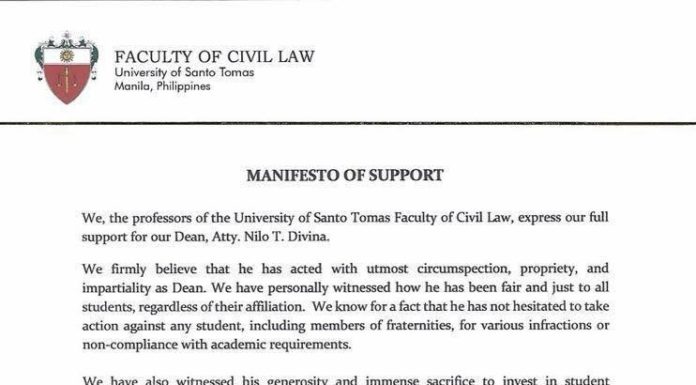 FOLLOWING the global buzz over Pope Benedict XVI’s latest remarks on condom use, Church leaders rushed to explain what the Pontiff really meant, saying Reproductive Health (RH) bill supporters took Benedict’s statements in the “wrong context.”
FOLLOWING the global buzz over Pope Benedict XVI’s latest remarks on condom use, Church leaders rushed to explain what the Pontiff really meant, saying Reproductive Health (RH) bill supporters took Benedict’s statements in the “wrong context.”
In the new book, Light of the World: The Pope, the Church, and the Sign of the Times, the Pope clearly pointed out that “[The Church] does not regard [the use of condoms] as a real or moral solution.”
Manila Auxiliary Bishop Teodoro Bacani, in an article posted on the Catholic Bishops’ Conference of the Philippines (CBCP) news website at the height of the issue, said RH bill supporters were using the statement of the Pope in an “entirely different context” in claiming that the Church has loosened its strict ban on contraceptives.
“The Pope made the issue clear. It wasn’t about birth control but was about AIDS (acquired immune deficiency syndrome) prevention. But it is misleading to think that the Pope said that condom is okay in the fight against AIDS,” Bacani said. “What he said was that it is not a moral and a real solution, but in some cases, it can be a first step toward the right moral direction.”
Echoing Bacani’s claims, Lingayen-Dagupan Archbishop Emeritus Oscar Cruz said pro-RH bill groups were distorting the statement made by the Benedict XVI to pursue their own vested interests.
“When we argue, let’s not take half-truths because we will lose that way. I’m sorry to disappoint people who are hoping otherwise,” Cruz said in the same website.
Faithful to its teachings
In a statement on cbcpnews.com, the CBCP said the Church remains faithful to its teachings, and that the Pope’s comments on the use of condoms were meant to avoid the spread of the sexually transmitted diseases (STDs), not to avoid procreation.
“He speaks of condom as a permissible tool, not the primary tool, to arrest [the] further spread of the HIV virus; [the] condom is not the moral solution to the alarming spread of the virus and disease,” CBCP Secretary General Msgr. Juanito Figura said.
Borderline case
Meanwhile, Fr. Rodel E. Aligan, O.P., dean of the UST Faculty of Sacred Theology, said the use of the condom to prevent the spread of AIDS is considered a “borderline case.”
“In moral theology and bioethics, you always talk about certain borderline cases. Borderline cases are not the rules. That does not remove the fact that the use of condoms is unethical,” Aligan said in an interview.
Aligan also used the principle of “lesser evil” in explaining the issue. “[The use of condom] is evil, but you avoid a greater evil [through it]. There might be a spread of AIDS and many will be affected,” he said.
The statement of the Pope also does not apply to all persons. The English translation of the book, which contains German journalist Peter Seewald’s series of interviews with the Pope, cited the case of male prostitutes. A Vatican spokesman later clarified that the Pope’s remarks on condom use for AIDS prevention covered all prostitutes.
“You cannot say that as long as there is STD involved, you can use condom. It does not follow because it is just an exemption to the rule,” Aligan said.
Compassionate Church
According to Aligan, the Pope’s statement just shows that the Church is naturally considerate.
“The Church is compassionate and that is what others do not realize. There are rules but there is also compassion in the Church,” he said. “It is after [the welfare of] the people.”
Aligan also noted that despite criticisms coming from various sectors, the Church remains unfazed.
“The ones who are greatly affected are those who do not understand. The more they will doubt [the Church and its teachings],” he said.
“[The Pope’s message] can be a subject of misinterpretation, whether consciously or unconsciously. This can be used by some in propagating their agenda, but the teaching of the Church still remains the same in terms of sexual morality,” he added.
According to Aligan, the other way to prevent the spread of STDs is to practice Catholic virtues.
“Christian life is a practice of virtue, especially the virtue of chastity and continence (self-control). That is what we need in our lives,” he said.
He also said it was not right to look at contraceptives as the “last resort” when abstinence and fidelity fail.
“The problem with last resort is that we think of every situation as the last. You should not consider that,” he said. “What is very important is to be convinced with the teachings of the Church. When people are convinced, they will know the right thing to do,” Aligan added.
The key to a morally sound life is following the teachings of the Church, he said.
“Catholics will always believe that the Church would not teach what is wrong. In this case of Pope Benedict, even if the Church teaches what is right, the Church understands a particular situation, and is therefore, compassionate,” Aligan said.
In the book released by the Ignatius Press of San Francisco, the Pope emphasized that his comment was not meant to weaken the stand of the Catholic Church against artificial birth control.
Condom use by prostitutes can be a “first step in the direction of a moralization” but it is not the ideal way to deal with the “evil of HIV infection,” he said.
In the latter part of the book, the Pontiff cited the so-called “Abstinence-Be faithful-Condom” or ABC formula introduced by secular health authorities to note that many people treat condoms as their “last resort.”
However, clinging to condoms as a last resort will result in sheer fixation on its use, and eventually, the “banalization” of humanity’s perception on sexuality, the Pope said.
“It is precisely the dangerous source of the attitude of no longer seeing sexuality as the expression of love, but only a sort of drug that people administer to themselves,” he said.
The Pope added that the Church should guide the people toward sexual practices that are morally acceptable.
“We must stand close to the people, we must guide and help them; and we must do this both before and after they contract the disease,” the Pope said. Jennifer M. Orillaza
















